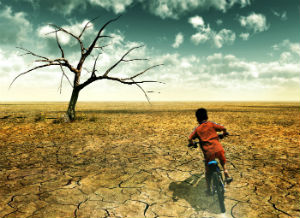Former UN high commissioner becomes senior advisor of new climate research centre
12 April 2018

Former UN High Commissioner for Human Rights and Irish President Mary Robinson has backed a new climate change research centre at the University of Reading by agreeing to be its senior advisor.
The Centre for Climate and Justice was launched in January at an event where Mrs Robinson was keynote speaker. It will support vulnerable communities threatened by climate change by focusing on justice and finding solutions to protect those most vulnerable to its effects.
Watch Mary Robinson speak of the importance of climate justice >>>
Mrs Robinson was President of Ireland from 1990-1997 and UN High Commissioner for Human Rights from 1997-2002. She is President of the Mary Robinson Foundation-Climate Justice, and from 2014-2015 was the UN Secretary-General's Special Envoy on Climate Change. She was also appointed UN Special Envoy on El Niño and Climate in 2016.
Mrs Robinson has been the recipient of many honours, including the Presidential Medal of Freedom from President Obama. She is a member of the Elders, former Chair of the Council of Women World Leaders and a member of the Club of Madrid, a non-profit organisation that seeks to promote democracy and change internationally.
Commenting on her latest role, Mrs Robinson said: "The opening of the Centre for Climate and Justice marks a significant milestone in the fight against climate change and the drive to ensure - as we take action to save our planet - we are committed to ensuring that people and communities made vulnerable by poverty and social exclusion aren't left behind."
New visiting professor
The Centre for Climate and Justice will also welcome a new visiting professor after a successful bid for funding to the Leverhulme Trust.
Professor Stephen Gardiner, Professor of Philosophy at University of Washington, will make two six-week long visits to the University of Reading, one year apart. He will be hosted by the Centre and work with Director Professor Catriona McKinnon on projects focused on the ethics of solar radiation management (SRM).
SRM techniques tackle the warming effects of greenhouse gas emissions by reducing the extent to which the Earth absorbs solar radiation, thus cooling the planet. Potential techniques include reflecting the sun's rays away from the Earth by placing huge mirrors in space, painting roofs and other structures white or genetically modifying plants to make their surfaces more reflective, and injecting sulphur dioxide particles into the stratosphere.
Professor Catriona McKinnon, Director of the Centre for Climate and Justice, said: "The prospect of climate engineering raises fundamental questions of ethics and justice. It forces us to think critically about what we owe to future generations, and about our relationship to the planet."
Centre professor gets IPCC role
Professor Chuks Okereke, Associate Director of the Centre for Climate and Justice, has been given a senior role by the Intergovernmental Panel on Climate Change (IPCC) to produce its next world-leading climate change report.
Professor Okereke was named a Coordinating Lead Author for Working Group III for the IPCC's Sixth Assessment Report, due for completion in 2022. The report will comprehensively assess scientific evidence since the last report in 2014, which provided input to the Paris Agreement of 2015.
